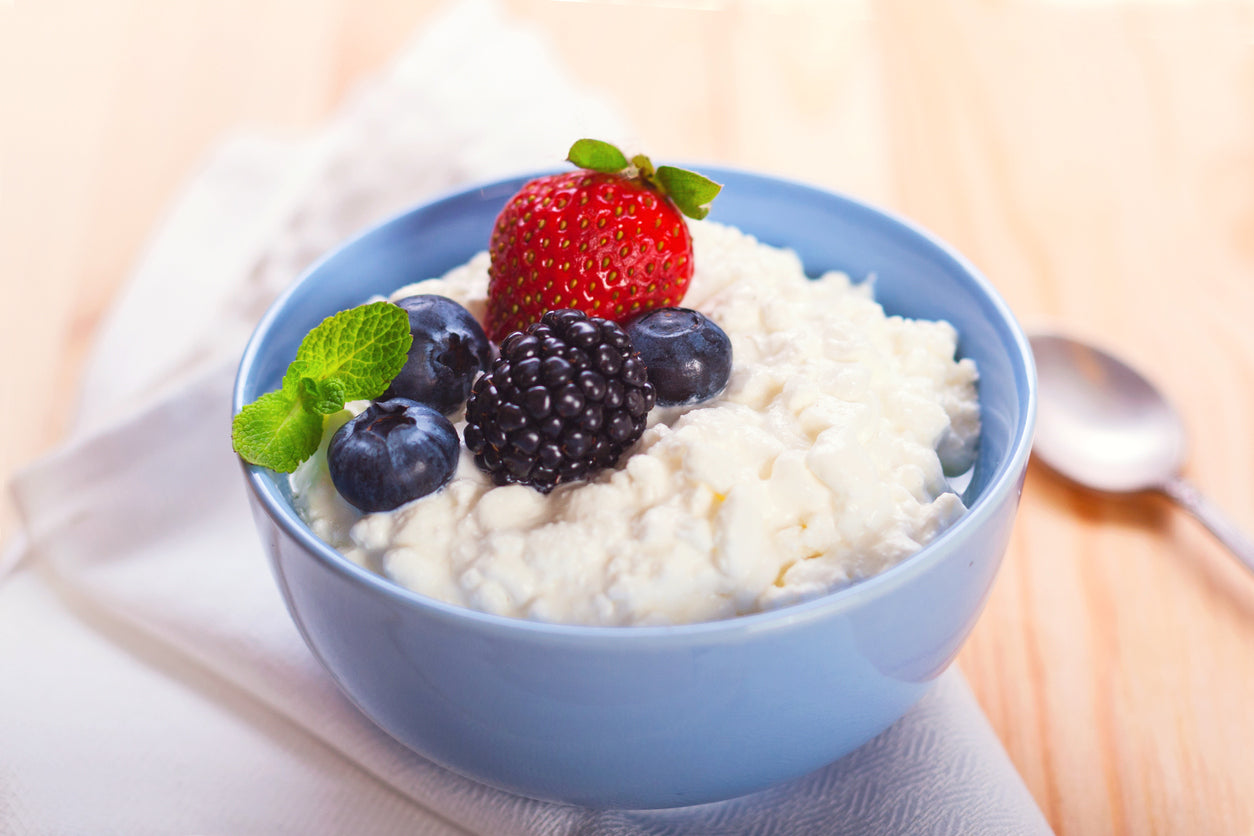This nutritious food can promote weight loss – while it packs on the lean muscle

While most people are aware that cottage cheese is a nutritious, diet-friendly food, many don’t realize the full extent of its contribution to health. The fact is, this mild-tasting cheese product is sought out by weightlifters, bodybuilders and serious athletes who are looking to enter “beast mode.” And, there’s good reason for it - cottage cheese is serious fuel for a workout!
To see how cottage cheese promotes fat loss, maintains healthy muscle growth and provides unparalleled nutrition, keep reading.
Cottage cheese is protein-rich, with all 9 essential amino acids
High-protein foods are optimal for building muscle. (This can be especially important for older individuals, who lose up to one percent of their muscle mass every year after age 40!) With a half-cup serving of low-fat cottage cheese providing a remarkable 14 grams of protein, this food fills that bill. And this serving provides the adult daily requirement for all nine essential amino acids - including leucine, which is particularly important for the growth and maintenance of muscle.
Moreover, 80 percent of the protein in cottage cheese is in the form of casein, which has been shown to increase muscle synthesis. There’s no doubt about it - cottage cheese can help you “bulk up!”
Cottage cheese may promote weight loss
The high level of protein in cottage cheese supports a feeling of satiety, or fullness. This can help stave off food cravings and reduce appetite. Research has shown that people who ate high-protein foods - such as cottage cheese - for a year decreased their weight by an average of 6.2 pounds. In addition to delivering “big-time” on protein, cottage cheese is rich in calcium, with 94 mg in a half-cup serving. Calcium appears to help reduce the accumulation of fat and accelerate fat-burning.
In a review published in International Journal of Molecular Science titled “Anti-Obesity Effects of Dietary Calcium,” the authors cited a study in which a calcium-rich diet was effective in reducing harmful abdominal fat in overweight patients. (The National Institutes of Health advises that adults get 1000 mg to 1200 mg of calcium a day). With a half cup of low-fat cottage cheese providing a reasonable 81 calories, this low-glycemic food is an ideal choice for those looking to sustain healthy weight.
Cottage cheese provides essential vitamins and minerals
In addition to its whopping 14 grams of protein, a half-cup serving of low-fat cottage cheese provides 3 grams of carbs and a single gram of fat. It also offers up 29 percent of the recommended daily amount for vitamin B-12 - which helps to remove homocysteine, an inflammatory chemical, from the blood - along with19 percent of the recommended daily allowance for selenium, an antioxidant mineral believed to be protective against cancer. Other important nutrients in cottage cheese include folate, copper, zinc, vitamin B6, choline and bone-building phosphorus.
It's simple to add cottage cheese to your diet
Cottage cheese is made from the curds of pasteurized cow’s milk, usually by adding an acidic substance such as vinegar, which separates the curds of casein protein from the whey (or fluid). Cottage cheese’s mild flavor makes it an ideal backdrop for sweet, sour, spicy or savory companions.
You can use it to enrich a smoothie, or mix it with your favorite fruits, such as peaches, mandarin oranges and apricots. Add it to omelets or eggs, or enjoy it with crunchy almonds, walnuts or flaxseed. You can also use cottage cheese in dips and sauces in place of milk or sour cream - or as an inexpensive substitute for ricotta cheese in lasagna recipes. If you just want to eat cottage cheese as a “solo,” there are plenty of seasonings - such as black pepper, chili pepper, paprika and garlic - which can add zip.
If you’ve been advised to limit your salt intake, you might want to look for a low-sodium product. (A half cup of cottage cheese provides a fifth of the adult recommended daily value for sodium). Similarly, people with lactose intolerance will want to opt for lactose-free brands.
Due to casein’s slow absorption rate, cottage cheese is believed to be most effective for building muscle and powering next-day workouts when it is eaten at bedtime the night before.
Despite its somewhat bland reputation, there is nothing boring about cottage cheese. It is a true nutritional powerhouse - and a fabulous addition to your healthy diet.
Sources for this article include:






